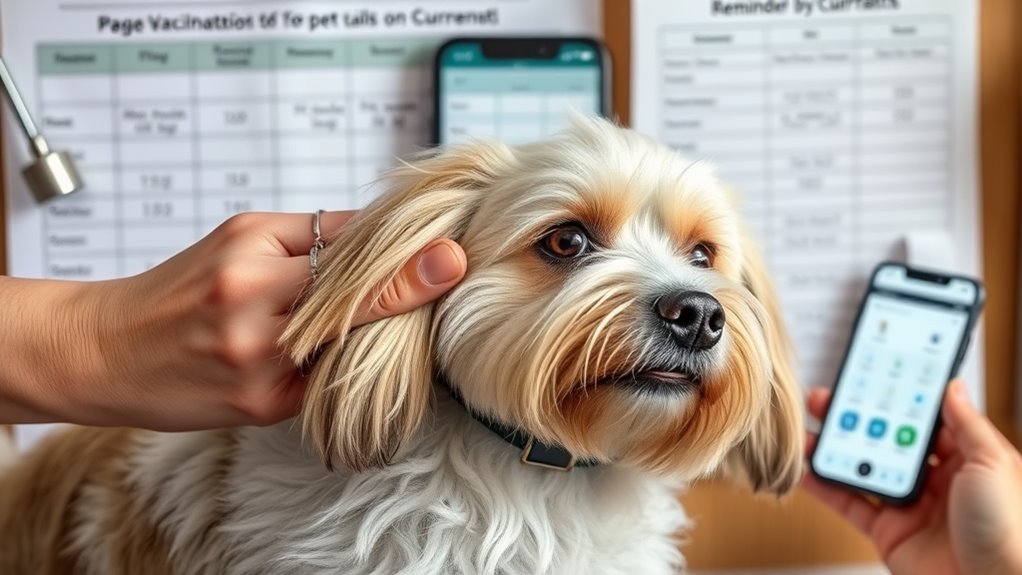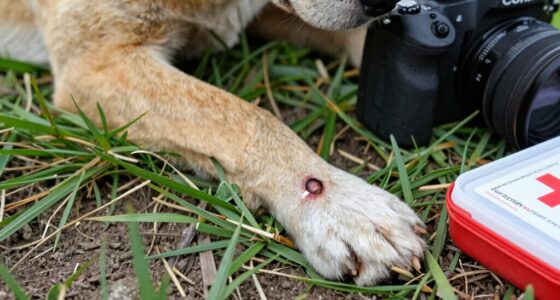To guarantee your pet stays safe during emergencies, keep vaccinations and microchip information up to date. Regularly check that your pet’s vaccination records are current and easily accessible, whether digitally or on paper. Update your microchip registration details annually to avoid delays. Keeping contact info accurate and maintaining an organized emergency kit helps speed up reunions and care. If you want proven tips on staying prepared, you’ll find useful details as you continue.
Key Takeaways
- Regularly update microchip registration details and contact information with the registry and vet to ensure accuracy.
- Keep vaccination records current and accessible, using digital or physical copies for quick reference during emergencies.
- Set reminders for annual microchip and vaccination updates to prevent outdated or lost information.
- Use online portals to easily manage, update, and share pet vaccination and ID records with shelters or veterinarians.
- Maintain an organized emergency kit with copies of vaccination records and microchip registration details for rapid access during crises.

Have you ever considered how quickly an emergency can happen, leaving you unprepared with your pet? Whether it’s a sudden accident, a natural disaster, or your pet slipping out of the yard, being ready can make all the difference. One of the most effective ways to guarantee a swift reunion if your pet gets lost is through up-to-date identification. Microchip scanning plays a pivotal role here. When your pet is microchipped, a quick scan at a shelter or veterinary clinic can reveal your pet’s unique ID number. This number is linked to your contact information in a secure database, making it easier to locate you and bring your furry friend home. But a microchip isn’t enough on its own. You need to keep your registration current, especially if you move or change contact details. Regularly confirming that your microchip information is accurate guarantees that, no matter what, your pet can be identified quickly during an emergency.
Alongside microchip scanning, maintaining accurate vaccination records is essential. In many emergency situations, such as exposure to contagious diseases or entering shelters, proof of vaccinations can be required. Having your pet’s vaccination records organized and readily accessible saves time and prevents unnecessary delays. It also provides peace of mind that your pet is protected against common illnesses, which can be especially important if your pet is injured or needs veterinary care quickly. Carrying a digital or physical copy of these records ensures you’re prepared, even if you can’t access your usual files. Many veterinary clinics now offer online portals where you can keep digital copies of vaccination records updated and easily share them when needed. Regular check-ups with your vet ensure your records are current, and any booster shots are administered on schedule. Additionally, selecting a preppy dog name that reflects your pet’s personality can help foster a strong bond and make your pet more recognizable in emergencies.
Keeping both your microchip information and vaccination records up to date might seem simple, but it’s often overlooked. It’s easy to forget to update details or lose track of paperwork in hectic moments. Set reminders to confirm your contact details with your vet and microchip registry annually. This small step can prevent delays in identification or treatment in an emergency. It’s also helpful to maintain a pet emergency kit with copies of important documents so you can quickly access them when needed. Staying informed about emergency preparedness can help you stay calm and ready in unexpected situations. Regularly reviewing your microchip registration details ensures your pet’s information remains current and accurate. You can also consider updating your contact info regularly to ensure your details are always current. By staying proactive, you’re ensuring that your pet’s safety is always prioritized, giving you peace of mind that you’re prepared for whatever unexpected situation might arise.
Frequently Asked Questions
How Often Should I Update My Pet’s Vaccination Records?
You should update your pet’s vaccination records based on their vaccination schedules, which vary by age, health, and local laws. Typically,, you’ll need to renew core vaccines annually or every three years. Keep your records organized and stored securely, whether digitally or in a folder. Regularly review and update these records to ensure your pet stays protected and you have all necessary documentation for visits or emergencies.
What Should I Do if I Lose My Pet’S ID Tags?
Losing your pet’s ID tags feels like a chapter from a story gone awry. To handle a lost pet, immediately contact local shelters and vets, and provide a recent photo. For ID tag replacement, visit your pet store or order new tags online, ensuring your contact info is current. Consider microchipping as a reliable backup—this way, even if tags are lost, your pet can still find their way back home.
Are Microchips Enough for Pet Identification in Emergencies?
Microchips are helpful, but they have limitations and aren’t enough on their own for pet identification during emergencies. They can’t be seen without a scanner, and you might not find a vet immediately. That’s why an ID tag is essential; it’s visible and provides instant contact info. Combining both—microchip and ID tag—gives your pet the best chance of quick recovery if they get lost.
How Can I Ensure My Pet’S Vaccination Records Are Accessible During a Disaster?
Ever wonder how you can access your pet’s vaccination records during a disaster? You should implement digital recordkeeping to store copies of their vaccination history securely online or on a cloud service. Also, include printed copies in your emergency kit preparedness. These steps ensure quick access, so if disaster strikes, you can provide proof of vaccinations and keep your pet safe and healthy in any situation.
What Are the Legal Requirements for Pet Vaccinations in My Area?
You should first check your local regulations to understand the legal compliance and vaccination laws for pets. These laws often specify required vaccinations like rabies, which may vary by area. Stay informed by visiting your city or county’s animal control website. By following these vaccination laws, you guarantee your pet stays protected and compliant, reducing legal risks and helping in emergencies or legal situations.
Conclusion
By keeping your pet’s vaccinations and IDs up to date, you’re not just preventing illness or losing them—you’re reinforcing the idea that preparedness can turn chaos into comfort. Some believe that a well-prepared pet owner can influence their pet’s fate in emergencies. Remember, staying proactive isn’t just about rules; it’s about showing love and responsibility. When you prioritize their safety, you’re embracing a truth: readiness creates peace of mind for both of you.










